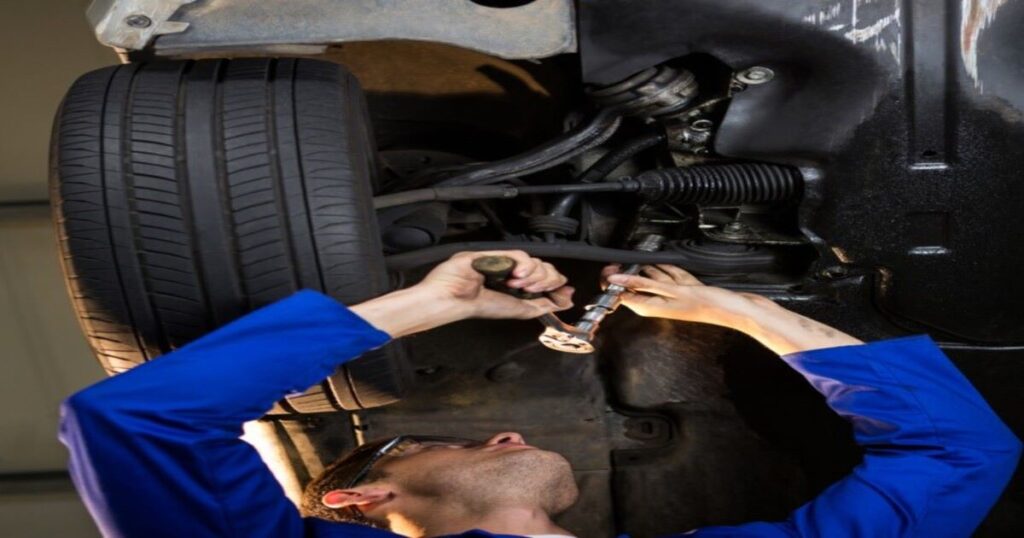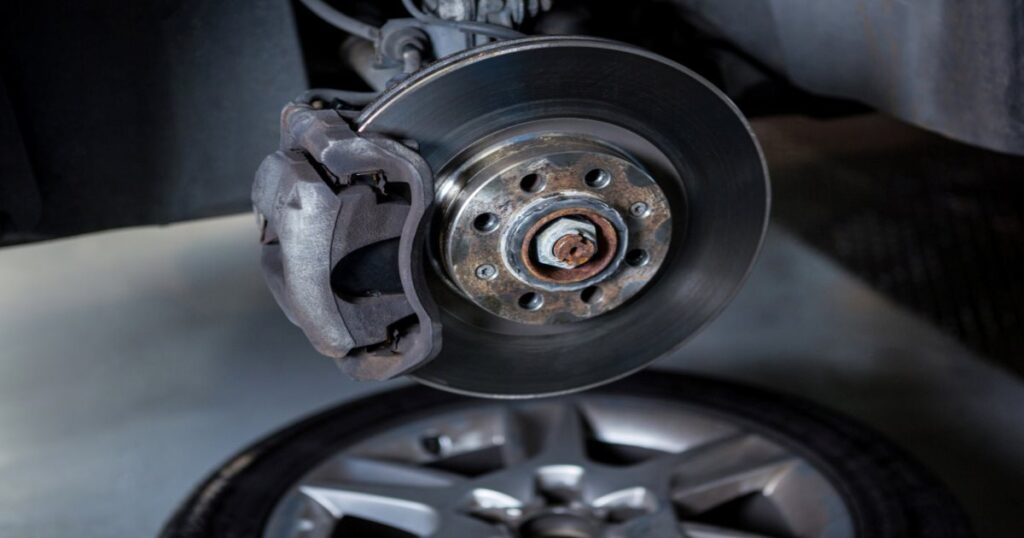Is your car making a noise every time you turn? It could be a sign of a problem with your tires, suspension, or steering. If you’re not sure what the problem is, don’t worry. Here’s a guide to let you have an overall idea about why a car makes noise when turning, what happens to the car when it makes noise, and how to solve the noise issue.
Let’s dive in.
Different Speeds Cause Car Noise Problems
Actually, the speed at which a car is traveling can certainly contribute to the level of noise it makes. Let’s talk about it in detail below:
1. Low Speed
Have you ever heard a strange sound coming from your car while driving at low speed? This may be caused by your brakes or tires. When driving at a lower speed, the brakes and tires have to work harder to slow the car down and may start to wear out. Worn brakes can create a screeching sound, while worn tires can cause a booming or rattling noise.
2. Average Speed
The average speed of a car can also play a role in determining the sounds a car emits. As cars accelerate, air flow creates a high-pitched noise known as an “aerodynamic whistle.” The faster a car is traveling, the more pronounced this sound will be. Additionally, tires will make more noise at higher speeds due to increased friction with the road surface.
3. High Speed

As a car accelerates, the tires and engine produce more friction, resulting in louder sounds. In addition, the faster a car is going, the more likely it is to encounter bumps or rough patches on the road, causing even more noise.
However, it’s important to note that a car’s overall design can also play a role in its decibel level. A well-built and well-maintained vehicle will generally produce less noise, regardless of its speed. So while speed is definitely a factor, it isn’t the only factor in determining how noisy a car is on the road.
Different Types of Common Car Noises When Turning

While driving, most people do not notice whether their car is making noise or not until it is too loud. Any loud and weird noise coming out of the car signifies that the car is having some problems. Here are some common car noises that cars make when turning right or left:
1. Popping Noise
The possible reasons can be worn-out suspension components, uneven tire pressure, damaged control arm bushings, and damaged CV joints.
2. Clicking Noise
This is likely due to worn-out components in the car’s power steering system. This can also happen if there is debris caught in the system, or a leak causing fluid levels to drop.
3. Squeaking Noise
When turning, the weight of the car shifts and causes tension on different parts of the suspension. If you find the steering wheel squeaks when turning it is actually lubricant being squeezed out from inside the joints, helping to prevent friction and wear on the components. If constantly the car squeaks when turning or the noise becomes unusually loud, take your vehicle for maintenance to ensure all parts are functioning properly.
4. Whining Noise
It’s caused by worn-out power steering fluid or a faulty power steering pump. When the fluid levels are low or the pump isn’t functioning properly, it can create air bubbles in the system which make that distinct whining noise.
Causes of Car Noises When Turning
1. CV Joint (Constant Velocity Joint) Is Wearing Out

The constant velocity joint is responsible for transferring power from the transmission to the wheels, ensuring smooth operation while turning. As the joint begins to wear out, it can cause clicking or clunking noises. In severe cases, it may also lead to loss of power while turning or an inability to turn at all. Fortunately, this issue can often be resolved by replacing the damaged CV joint. Regular inspections and maintenance can help prevent unexpected wear on the CV joint, resulting in a smoother and quieter ride.
2. Damaged Driveshaft
Have you ever heard a loud clunking noise when turning your car? It may be a sign of a damaged driveshaft. The driveshaft is responsible for transferring power from the engine to the wheels, allowing your car to move forward. When it becomes worn or damaged, it may result in a clunking or knocking sound when turning. If you suspect that your driveshaft may be damaged, have it checked by a professional mechanic as soon as possible for proper diagnosis and repairs?
3. Steering Wheel Friction or Worn Steering Wheel

Friction can occur when grease and dirt build up on the steering system, causing it to stick and not move smoothly. This can also happen if the steering wheel itself is worn and cracked, as it will not easily rotate on its axis. In either case, not only will it cause uncomfortable noise and vibrations, but it can also lead to dangerous control problems while driving. Keep your steering system lubricated and in good condition to ensure smooth and quiet turns while on the road.
4. Failed Power Steering System
Have you ever been driving and heard a strange noise when turning the steering wheel? The culprit could be a failed power steering system. Without power steering, the driver must exert more force to turn the wheels, leading to increased strain on the system and ultimately causing noise. In addition, a leak in the power steering fluid can also result in noise as it spills onto other components. Other possible issues could include worn-out suspension components or low engine oil levels. By identifying and addressing the problem early on, you can ensure smooth and quiet turns for years to come.
5. Damaged Tie Rods
If your car is making strange noises while turning, it could be a sign of damaged tie rods. These small but crucial components help transfer force from the steering rack to the wheels, allowing you to turn and steer. If they become worn or bent, they can cause loud clunking or squeaking noises during turns. In addition, weakened tie rods can affect your ability to properly control the vehicle and may even lead to tire misalignment. Taking care of this issue can save time and money in the long run.
6. Bad Wheel Bearing

The wheel bearing allows for smooth rotation of the wheels and, over time, can wear down or become damaged. This can lead to a grinding or growling noise, especially when turning at lower speeds. If left unaddressed, a faulty wheel bearing can also lead to damage to other car parts and potentially result in an accident. It’s important to have a mechanic inspect and replace the wheel bearing as soon as possible to ensure safe driving conditions.
7. Issue With The Power Steering System
Without proper function, turning a car can require more effort and result in a loud squealing or grinding noise. In severe cases, it can even lead to loss of control while driving. Fortunately, power steering issues are typically easy to fix as long as they are caught early on. If you notice any strange noises while turning or if your steering feels unusually stiff, don’t hesitate to have it inspected by a professional mechanic. Taking care of the issue now can save you from bigger headaches in the future.
8. Worn Suspension Strut
When going for a joyride in your car, the last thing you want to hear is strange rattling or creaking noises coming from the suspension. Unfortunately, these noises might be an indication of a worn suspension strut – and ignoring it can lead to bigger problems down the road. The suspension struts absorb the impact of uneven terrain. They also support the weight of the car and act as a stabilizer during turns. When they begin to wear out, they become less able to do their job effectively, leading to clunking or screeching sounds while turning. Don’t let old struts ruin your driving experience – take care of them before it’s too late.
How Can You Fix Car’s Steering Noises?
One possibility is worn-out or loose power steering fluid, in which case adding more fluid or tightening up the parts may solve the problem. Another potential culprit is damaged ball joints or tie rod ends, which support the wheels and allow them to turn properly. These can usually be replaced easily with new parts. It’s also possible that clunks and squeaks could be coming from worn-out suspension components such as shocks or struts. Replacing these may require professional help, but it’s worth it to ensure smooth and safe driving. By staying on top of potential steering issues, you can prevent further damage and avoid pricey repairs down the road.
Why Does A Car Make Noise When Turning Right But Not Left?
One possible explanation for the noise occurring only when turning right is that the internal components on the right side of the car may be worn down or loose. When making a turn, these parts are put under stress and may scrape against each other, causing a grinding or screeching sound. Another potential reason is that the right-side tires may not be inflated properly, causing them to rub against the inside of the wheel well while turning. Checking and adjusting tire pressure and having a mechanic inspect the components on the right side of the car, can help resolve this issue and eliminate any unusual noises.
Why Does A Car Make Whining Noise When Turning The Steering Wheel While Accelerating?
This is likely caused by a power steering pump issue. The power steering system uses fluid to assist in turning the wheels, and this fluid is pumped through the system by the power steering pump. A faulty or failing pump can make strange noises, and may also cause excessive resistance when trying to turn the wheel. In some cases, it may even lead to a complete loss of power steering function. Fortunately, power steering pumps can usually be replaced relatively easily by a trained mechanic.
Final thoughts,
This guide is useful for those who often hear high-pitched noise coming from their car while driving, accelerating, lowering the speed or just turning the steering wheel. Never leave your car unchecked in such a condition. Be sure to have any strange noises checked out as soon as possible for optimum vehicle performance and safety.
FAQs
1. Can bad alignment in the car cause creaking?
Yes, bad alignment in the car can cause creaking. When the wheels are out of alignment, it causes excessive stress on certain parts of the car such as the suspension, steering system, and tires. This extra stress can cause components to wear down prematurely and eventually start to make noise.
2. Is the car making noise while turning dangerous?
It depends on a number of factors, including the make and model of the car, the condition of the tires, and how well the driver is handling the turn. That said, in general, if there is noise coming from the car while it’s turning, it could be an indication that there is something wrong and that it needs to be fixed.
3. Why does the car make noise while reversing?
One possibility is that the sound is being generated by the movement of the gears as they change direction. Another possibility is that the sound is being generated by the contact between the tires and the road. A third possibility is that there may be something wrong with the car’s brake system, and it’s rubbing against another component as it moves backward.
